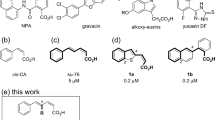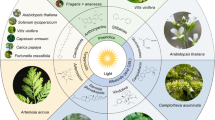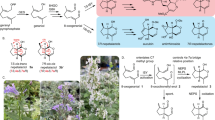Abstract
IT has been recently demonstrated that the two stereoisomeric forms of certain α-aryloxypropionic acids can differ widely in their capacity to induce growth responses in plants. Thus, for example, the (+)-forms of α-(2-naphthoxy)-, α-(2 : 4-dichlorophenoxy)- and α-(2 : 4 : 5-trichlorophenoxy)-propionic acids possess high growth-regulating activity, whereas the (−)-isomers possess only negligible activity. The (±)-acids give an intermediate response in the tests employed1,2.
This is a preview of subscription content, access via your institution
Access options
Subscribe to this journal
Receive 51 print issues and online access
$199.00 per year
only $3.90 per issue
Buy this article
- Purchase on Springer Link
- Instant access to full article PDF
Prices may be subject to local taxes which are calculated during checkout
Similar content being viewed by others
References
Smith, M. S., and Wain, R. L., Proc. Roy. Soc., B., 139, 118 (1951).
Smith, M. S., Wain, R. L., and Wightman, F., Ann. App. Biol. (in the press).
Koepfli, J. B., Thimann, K. V., and Went, F. W., J. Biol. Chem., 122, 763 (1938).
Osborne, D. J., and Wain, R. L., Science, 114, 92 (1951).
Author information
Authors and Affiliations
Rights and permissions
About this article
Cite this article
SMITH, M., WAIN, R. & WIGHTMAN, F. Antagonistic Action of Certain Stereo-isomers on the Plant Growth-regulating Activity of their Enantiomorphs. Nature 169, 883–884 (1952). https://doi.org/10.1038/169883b0
Issue Date:
DOI: https://doi.org/10.1038/169883b0
Comments
By submitting a comment you agree to abide by our Terms and Community Guidelines. If you find something abusive or that does not comply with our terms or guidelines please flag it as inappropriate.



